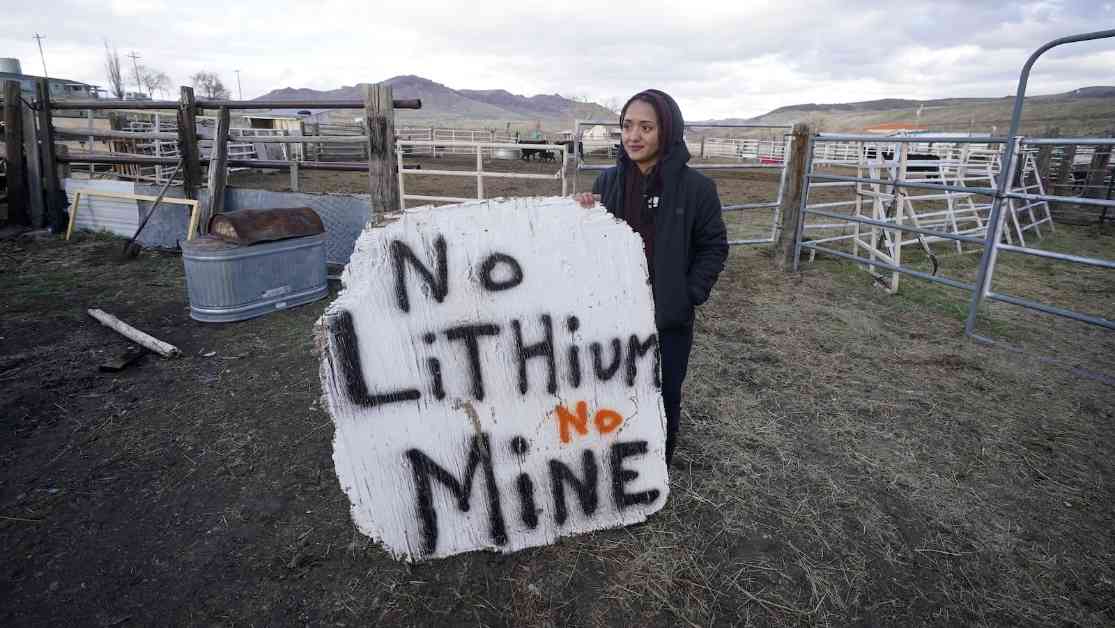Canadian mining company, Lithium Americas, is making headlines with its $250 million investment to complete the construction of a new lithium mine in northern Nevada. This ambitious project is set to play a crucial role in advancing America’s transition from fossil fuel-powered cars to electric vehicles. However, the mine’s proximity to a burial site has sparked intense criticism from neighboring tribal nations and environmental watchdog groups.
Located in an area known as Thacker Pass, the mine aims to unearth lithium carbonate essential for producing batteries used in electric vehicles. This region, known as Peehee Mu’huh in the Numu language of the Northern Paiute, boasts what could potentially be the largest lithium supply in the United States. It also holds deep historical significance as a place where Native men, women, and children sought refuge following an 1865 attack by American soldiers at dawn.
Orion Resources Partners LP, a global investment firm specializing in metals and materials, has stepped in with a significant financial boost to facilitate the mine’s initial phase construction, set to conclude by late 2027. Additionally, Orion Resources is considering providing an additional $500 million to support subsequent phases of the project. This substantial investment underscores the strategic importance of Thacker Pass in enhancing national security and promoting the development of a domestic supply chain to reduce American reliance on foreign mineral suppliers.
The recent financial backing from Orion Resources comes amid mounting opposition to the mine’s construction. The American Civil Liberties Union and Human Rights Watch have raised concerns over the project’s approval process, highlighting potential violations of the rights of Indigenous peoples whose ancestors are interred in the vicinity of the mine. Despite these objections, Lithium Americas’ President and CEO, Jonathan Evans, has defended the project, emphasizing its significance in securing critical minerals for the nation.
While Lithium Americas asserts that research indicates the actual burial site is several miles away from the project area, Gary McKinney, a spokesperson for the People of Red Mountain, vehemently disagrees. As a descendant of a survivor of the 1865 massacre, McKinney, along with several others, firmly believes that the project site holds ancestral graves. This sentiment is supported by Indigenous oral histories and historical accounts that describe the tragic events that transpired in the region.
McKinney’s organization, People of Red Mountain, along with four tribes, including the Reno-Sparks Indian Colony, Burns Paiute Tribe, Summit Lake Paiute Tribe, and Winnemucca Indian Colony, have taken legal action to halt the mine’s progress. Despite their efforts, no court challenges have succeeded thus far. The Duck Valley Shoshone-Paiute Tribe has also raised concerns, criticizing the mine in an appeal to the United Nations special rapporteur on the rights of Indigenous peoples.
The American Civil Liberties Union and Human Rights Watch have underscored that the mine threatens Indigenous peoples’ right to free, prior, and informed consent with regard to projects affecting their territories. In response, Lithium Americas has pointed out that the U.N. Declaration on the Rights of Indigenous Peoples, while significant, is not legally binding. Moreover, the company maintains that consulting with tribes satisfies the requirement for project approval, even if not all tribes express support.
The new investment from Orion Resources Partners LP represents a critical step in fulfilling the terms of a $2.26 billion loan granted to Lithium Americas by the U.S. Department of Energy to advance the project. Abbey Koenning-Rutherford from the American Civil Liberties Union and Human Rights Watch has emphasized the broader implications of the Thacker Pass mine, noting the risks it poses to Indigenous communities and advocating for reforms to U.S. mining laws to protect tribal lands.
In light of the ongoing controversy surrounding the Thacker Pass mine, the United States faces a crucial juncture in balancing the nation’s energy needs with the preservation of Indigenous cultural sites. As stakeholders continue to engage in dialogue and legal battles over the fate of the mine, the future of this contentious project remains uncertain.














